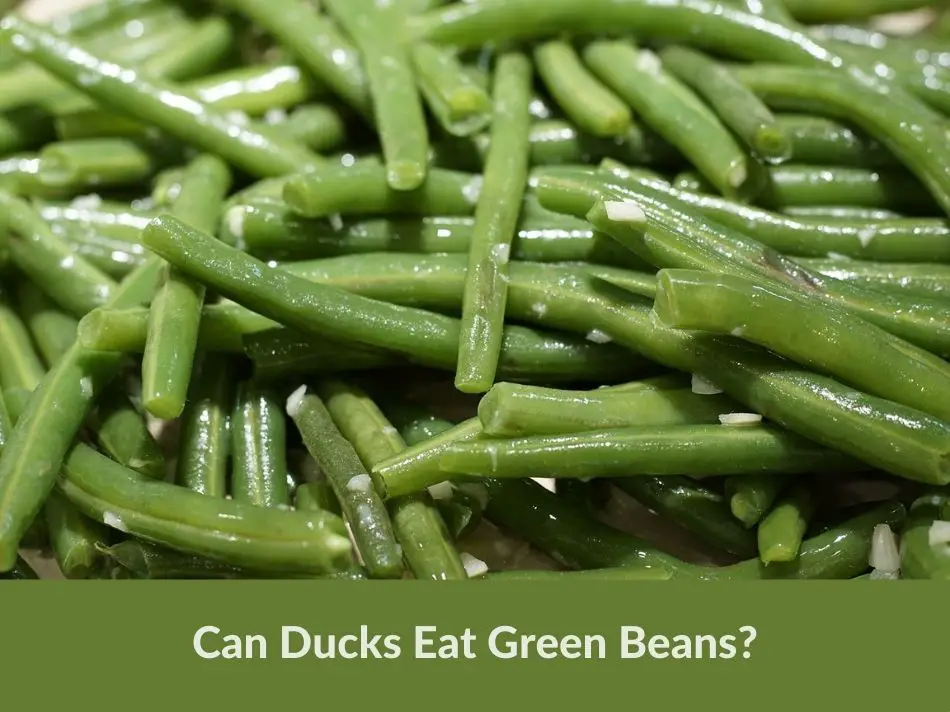Ducks are omnivorous, meaning that they eats both plants animals. In the wild, they’ll nibble on a mix of plants, small insects, and aquatic creatures. But, can ducks eat green beans?
Yes, ducks can eat cooked green beans. They are nutritious and make a great addition to their regular diet. Keep in mind that raw green beans contains lectins, which is toxic to ducks.
In this article, we delve into the suitability of green beans as a treat for ducks. From understanding a duck’s natural diet to the frequency of feeding green beans, we cover it all.
How Often Can I Feed My Ducks Green Beans?
Treats, even healthy ones like green beans, should not constitute more than 10% of a duck’s daily intake. Think of green beans as an occasional snack or a treat. Once or twice a week in small amounts should be more than sufficient.
Can Ducklings Eat Green Beans?
Ducklings have a slightly different diet from mature ducks, mainly focusing on protein-rich foods. While introducing green beans to ducklings isn’t harmful, it’s best to do so cautiously. Make sure the beans cooked and are finely chopped to prevent choking hazards. However, prioritize protein sources like insects and specially formulated duckling feed during their early growth stages.
Green Beans Nutritional Value
Below is the nutritional value of 100 grams of green beans.
- Calories: 31
- Protein: 1.83 g
- Carbohydrates: 6.97 g
- Fiber: 2.7 g
It also contains several vitamins and minerals as listed below.
- Vitamin C
- Vitamin A
- Vitamin K
- Vitamin B-6
- Vitamin E
- Calcium
- Magnesium
- Phosphorous
- Potassium
- Zinc
Are Green Beans Healthy for Ducks?
Indeed, green beans offer ducks a range of nutritional benefits. They’re a good source of vitamins like Vitamin C and Vitamin A, essential for overall health and immunity.
- Vitamin C: While ducks naturally produce Vitamin C, additional amounts can aid in collagen synthesis. This supports the health of their bill, feet, and feather attachments. Moreover, Vitamin C bolsters their immune system, offering added health protection.
- Vitamin A: This vitamin is vital for a duck’s vision, especially in dim light. It also supports healthy skin and feather growth. A lack of Vitamin A can lead to skin issues and vision disturbances.
- Vitamin K: Vital for blood clotting, Vitamin K ensures rapid wound healing. If a duck gets a minor injury, this vitamin helps prevent excessive bleeding.
- Vitamin B-6: This is essential for efficient protein metabolism in ducks, promoting muscle strength and overall health. It also supports optimal nervous system function due to its role in neurotransmitter synthesis.
- Vitamin E: Serving as an antioxidant, Vitamin E protects duck cell membranes from oxidative stress. This is especially beneficial for ducks exposed to sunlight or potential environmental toxins.
- Calcium: Beyond supporting bone health, calcium is crucial for laying ducks as it aids in producing robust eggshells. Insufficient calcium can lead to weak bones or eggs with soft shells.
- Magnesium: Key for muscle function, magnesium ensures ducks move smoothly both on land and water. It also supports various enzymatic reactions, contributing to general well-being.
- Phosphorous: Complementing calcium, phosphorous is integral for bone strength. It’s also involved in energy metabolism, helping ducks maintain their activity levels.
- Potassium: This mineral is vital for maintaining a regular heart rhythm in ducks. Additionally, it aids in muscle function and helps maintain electrolyte balance.
- Zinc: Central to various enzymatic reactions, zinc assists in protein synthesis, immune function, and DNA synthesis. It’s essential for overall duck health and vitality.
How To Feed Green Beans To Ducks
- Cleanliness is Key: Wash the beans thoroughly to remove any chemicals or dirt.
- Go Natural: Opt for organic green beans when possible.
- Boil Them: Always cook them to remove the lectins.
- Chop Chop!: Cut the beans into small, bite-sized pieces, especially if feeding ducklings.
- Avoid Seasoning: Never feed ducks beans that have been salted or seasoned.
- Always Serve With Water: Ducks need water to help them swallow food. Always ensure they have access to clean water when feeding them green beans or any other treats.
More Vegetables Ducks Can Eat
Ducks, known for their diverse diet, can safely indulge in a variety of vegetables. These veggies not only provide them with essential nutrients but also add a flavorful twist to their usual meals. Curious about what other vegetables our web-footed friends can munch on? Here are a few more to consider:
Conclusion
Green beans, when introduced properly, can be a delightful treat that ducks will undoubtedly enjoy. Remember, moderation is key, and always cook them and then serve with water. Happy feeding, and may your ducks quack with joy!
Disclaimer: The information in this article is for informational purposes only. I'm not an expert or a veterinarian.


